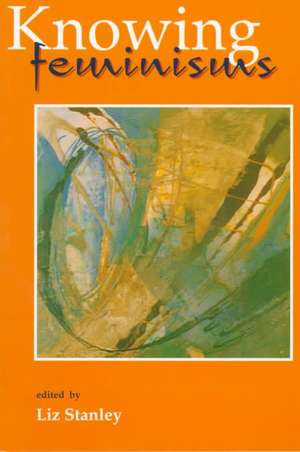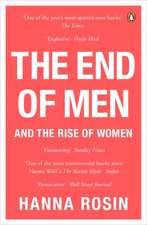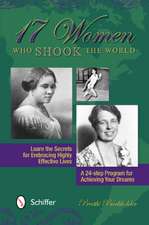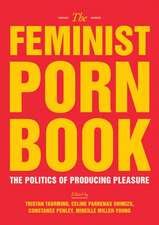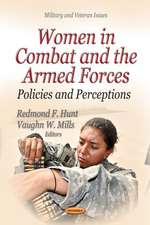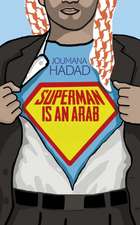Knowing Feminisms: On Academic Borders, Territories and Tribes
Editat de Elizabeth Stanleyen Limba Engleză Paperback – 9 mar 1997
Preț: 461.87 lei
Preț vechi: 543.38 lei
-15% Nou
Puncte Express: 693
Preț estimativ în valută:
88.38€ • 92.27$ • 73.14£
88.38€ • 92.27$ • 73.14£
Carte tipărită la comandă
Livrare economică 04-18 aprilie
Preluare comenzi: 021 569.72.76
Specificații
ISBN-13: 9780803975415
ISBN-10: 0803975414
Pagini: 224
Dimensiuni: 156 x 234 x 12 mm
Greutate: 0.32 kg
Ediția:1
Editura: SAGE Publications
Colecția Sage Publications Ltd
Locul publicării:London, United Kingdom
ISBN-10: 0803975414
Pagini: 224
Dimensiuni: 156 x 234 x 12 mm
Greutate: 0.32 kg
Ediția:1
Editura: SAGE Publications
Colecția Sage Publications Ltd
Locul publicării:London, United Kingdom
Recenzii
`Knowing Feminisms is an analysis of the complex relationship of the feminist academic with her profession... This book is an excellent compilation of feminist critiques from the standpoint of women in seven academic disciplines' - NWSA Journal
`Stanley's collection aims to avert the feminist gaze away from those "others" who are its subject matter, "and a little towards this `gaze' itself, to the process of knowledge production"... a necessary read' - Feminist Magazine
`Stanley's collection aims to avert the feminist gaze away from those "others" who are its subject matter, "and a little towards this `gaze' itself, to the process of knowledge production"... a necessary read' - Feminist Magazine
Cuprins
Introduction
On Academic Borders, Territories, Tribes and Knowledges
Whose Women's Studies? Whose Philosophy? Whose Borderland? - Anne Seller
Feminist Pedagogy to the Letter - Gina Mercer
A Musing on Contradictions
Negotiating the Frontier - Mary Evans
Women and Resistance in the Contemporary Academy
In Law and Outlaw? The Tale of a Journey - Angela Montgomery
Nursing the Academy - Jean Orr
Bordering on Change - Chris Corrin
Still Seeking Transformation - Sue Wilkinson
Feminist Challenges to Psychology
Feminist Theology - Elaine Graham
Myth, Mystery or Monster?
What Are Feminist Academics For? - Sue Wise
Dancing between Hemispheres - Carol Brown
Negotiating Routes for the Dancer-Academic
A Fantasy of Belonging? - Johanna Alberti
Identity and Representation - Uma Kothari
Experiences of Teaching a Neo-Colonial Discipline
Borderline Crosstalk - Ailbhe Smyth
Writing the Borders - Liz Stanley
Episodic and Theoretic Thoughts on Not/Belonging
What's a Nice Girl Like You Doing in a Place Like This? The Ambivalences of Professional Feminism - Kathy Davis
Knowing Feminisms and Passing Women
A Conclusion
On Academic Borders, Territories, Tribes and Knowledges
Whose Women's Studies? Whose Philosophy? Whose Borderland? - Anne Seller
Feminist Pedagogy to the Letter - Gina Mercer
A Musing on Contradictions
Negotiating the Frontier - Mary Evans
Women and Resistance in the Contemporary Academy
In Law and Outlaw? The Tale of a Journey - Angela Montgomery
Nursing the Academy - Jean Orr
Bordering on Change - Chris Corrin
Still Seeking Transformation - Sue Wilkinson
Feminist Challenges to Psychology
Feminist Theology - Elaine Graham
Myth, Mystery or Monster?
What Are Feminist Academics For? - Sue Wise
Dancing between Hemispheres - Carol Brown
Negotiating Routes for the Dancer-Academic
A Fantasy of Belonging? - Johanna Alberti
Identity and Representation - Uma Kothari
Experiences of Teaching a Neo-Colonial Discipline
Borderline Crosstalk - Ailbhe Smyth
Writing the Borders - Liz Stanley
Episodic and Theoretic Thoughts on Not/Belonging
What's a Nice Girl Like You Doing in a Place Like This? The Ambivalences of Professional Feminism - Kathy Davis
Knowing Feminisms and Passing Women
A Conclusion
Descriere
Knowing Feminisms looks at feminism as a vital source of new knowledge and new ways of working throughout a range of disciplines. It also scrutinizes the sometimes highly problematic forms its presence within academia can take. The contributors, all well-known feminist academics, discuss the epistemological and ontological `borderlands' that feminisms inhabit, which although within, still remain `other' to, the academy.
The book addresses fundamentally important questions such as: Should feminists work within traditional disciplines or abandon them in favour of Women's Studies? Is the idea of feminist pedagogy as `empowerment' actually one which de-skills? Does the feminist transformation of some academic disciplines
